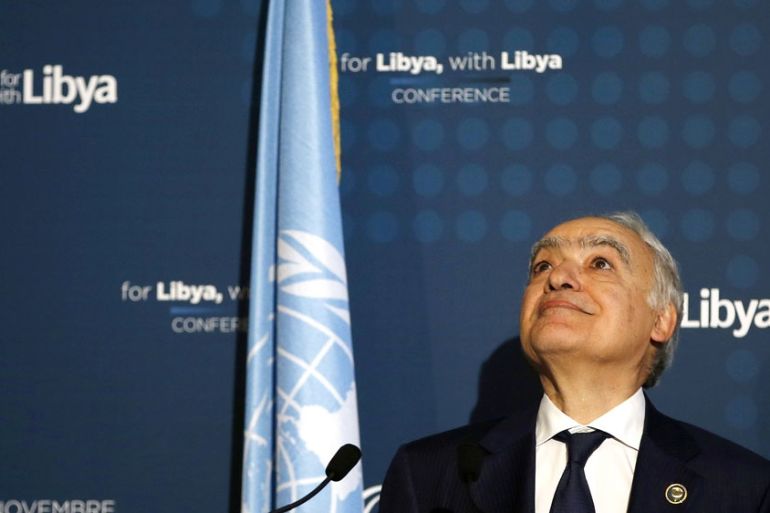Libya: Geneva talks end with no end in sight to fighting
Indirect talks in Swiss city were aimed at turning shaky truce into lasting ceasefire after 10 months of violence.

The first round of talks between military representatives of Libya‘s internationally-recognised government and eastern-based military commander Khalifa Haftar aimed at achieving a lasting ceasefire have ended with no breakthrough, the UN has said.
Five senior officers from the UN-brokered GNA and five others from Haftar’s self-styled Libyan National Army (LNA) convened this week in the Swiss city of Geneva amid renewed international efforts to end the conflict, which intensified in April when the eastern forces launched an offensive to seize the capital, Tripoli, from the GNA.
Keep reading
list of 3 itemsLibya rivals show ‘genuine will’ to start ceasefire talks: UN
Commander Khalifa Haftar’s forces choke Libya’s oil flow
The United Nations Support Mission in Libya said in a statement on Saturday it thanked the two parties for agreeing to come to Geneva as well as their “high professional and positive spirit” throughout the discussions.
The talks, which were mediated by UN Special Envoy Ghassan Salame, did not include face-to-face meetings.
On Thursday, Salame had reported “progress” in the talks aimed at turning a fragile truce into a permanent ceasefire that would have included a monitoring role for the world body.
“Two days ago, Salame said there were some points of divergence,” Al Jazeera’s Hoda Abdel-Hamid, reporting from Geneva, said. “He was hoping that they could come to some sort of agreement or middle ground but that did not happen.”
Salame had issued a statement at the time, saying that two parties agreed on the need to continue abiding by the shaky truce, as well as the need to preserve Libya’s sovereignty.
“The GNA said it was Haftar’s forces [that needed] to pull back all the way to the pre-April 2019 position, basically to return to Benghazi which is something that Haftar has not agreed to,” Abdel-Hamid said.
While the two parties agreed on the need to expedite the return of internally displaced people, especially in the areas of clashes, they did not reach a full understanding on the best ways to achieve that goal.
At a summit in the German capital, Berlin, last month, world powers committed to ending all foreign interference in the oil-rich country and to uphold a weapons embargo to help end the war.
But Salame said this week the embargo was being breached with weapons, ammunition and foreign fighters arriving to support both sides in the conflict.
Haftar is backed by the United Arab Emirates and Egypt, as well as France and Russia. Meanwhile, Turkey is the GNA’s main supporter.
Speaking from the Ethiopian capital Addis Ababa, UN Secretary-General Antonio Guterres regretted that the conflict has been “aggravated” by foreign intervention.
“With regards to Libya, it is evident that the crisis has been severely aggravated by the presence of forces and equipment from many other countries, in clear violation of the mandate of the Security Council,” Guterres said.
“I think we have to re-establish the sovereignty of international law and the conditions in which the decisions of the Security Council could be implemented and that countries should understand that their engagements to promote certain conflicts only increases the potential for action by terrorist groups.”